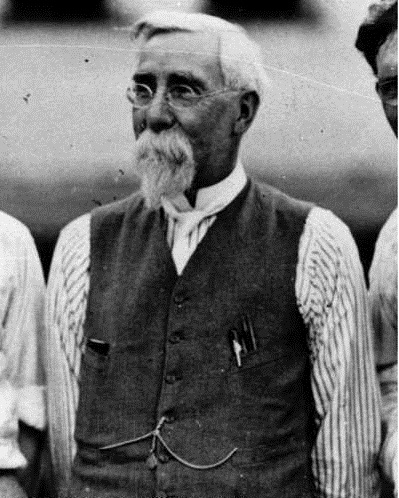Henry Leland (Henry Martyn Leland)

Henry Leland was born to Leander and Zilpha, the youngest of 8, in Vermont in 1843. Sources differ on the town of his birth (Danville versus Barton); he grew up in Barton. He learned engineering and precision machining in the Brown & Sharpe plant at Providence, Rhode Island. He subsequently worked in the firearms industry, including at Colt. These experiences in toolmaking, metrology, and manufacturing steeped him in the 19th-century zeitgeist of interchangeability. He applied this expertise to the nascent motor industry as early as 1870 as a principal in the machine shop Leland & Faulconer, and later was a supplier of engines to Ransom E. Olds’s Olds Motor Vehicle Company, later to be known as Oldsmobile. He also invented the electric barber clippers, and for a short time produced a unique toy train, the Leland-Detroit Monorail.
Henry Leland created the Cadillac automobile, later bought out by General Motors. In 1902, William Murphy and his partners at the Henry Ford Company hired Leland to appraise the company’s factory and tooling prior to liquidation. Henry Leland completed the appraisal, but he advised Murphy and his partners that they were making a mistake to liquidate, and suggested they instead reorganize, building a new car powered by a single-cylinder engine Leland had originally developed for Oldsmobile. The directors lost no time in renaming the company Cadillac. At Cadillac, Leland applied many modern manufacturing principles to the fledgling automotive industry, including the use of interchangeable parts. Alfred P. Sloan, longtime president and chair of General Motors, considered Leland to be “one of those mainly responsible for bringing the technique of interchangeable parts into automobile manufacturing.” The Cadillac won the Dewar Trophy for 1908. Leland sold Cadillac to General Motors on July 29, 1909 for $4.5 million, but remained as an executive until 1917. With Charles Kettering, he developed a self-starter for the Cadillac, which won its second Dewar Trophy in 1913 as a result. He prodded Kettering to design a workable electric starter after a Cadillac engineer was hit in the head and killed by a starting crank when the engine backfired. He left General Motors in a dispute with company founder William C. Durant over producing materiel during World War I. Cadillac had been asked to build Liberty aircraft engines but Durant was a pacifist.
Henry Leland founded Lincoln, later purchased by the Ford Motor Company. Leland formed the Lincoln Motor Company, got a $10,000,000 contract and started building the V12 Liberty engine. After the war, the company was reorganized, and the Lincoln Motor Company Plant was retooled to manufacture luxury automobiles. The V8 engine used in the first Lincoln automobiles is said to be influenced by the Liberty engine’s design. In 1922, Lincoln became insolvent and was bought out by Henry Ford’s Ford Motor Company. Ford’s bid of $8 million was the only bid at a receivers sale. Ford had first offered $5 million, but the judge would not accept it for a well-equipped company whose assets were conservatively estimated at $16 million. Ford deliberately low-balled his offer as revenge against Leland’s role in the creation of Cadillac. After the sale, Leland and his son Wilfred continued to run the company, believing they would still have full control to run the company as they saw fit. Ford assigned a number of their people to Lincoln, they said to learn. However, it soon became clear they were there to streamline their production and stop the loss of money that had bankrupted Lincoln. Relations between the Henry Ford and Leland workers continued to deteriorate. On June 10, 1922, Ford executive Ernest Liebold arrived at Lincoln to ask for the resignation of Wilfred Leland. When it became clear that Liebold had the full authority of Henry Ford, Henry Leland resigned as well. That afternoon both men were shown out of the factory they had created. The Lincoln continues to be part of the luxury line of Ford to the present. Leland had no connection to the Lincoln Motor Car Works, a marque sold by Sears-Roebuck from 1905-1915.
Henry Leland was the son of Leander Leland and Zilpha Tifft. He married Ellen Rhoda Hull b. 04/24/1846 – 01/15/1914 (daughter of Elias Hull). They had three children: Martha Gertrude b.1868 – ?; Wilfred Chester b. 11/07/1869 – 1958; and Miriam Edith b. 1872 – 1894. They were all born in Millbury, Massachusetts. Henry M. Leland died in Detroit, and is buried there in Woodmere Cemetery.
Born
- February, 16, 1843
- USA
- Vermont
Died
- March, 26, 1932
- USA
- Detroit, Michigan
Cemetery
- Woodmere Cemetery
- Detroit, Michigan
- USA


